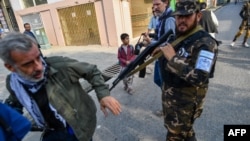More than 30 instances of violence and threats of violence against Afghan journalists were recorded in the last two months, with nearly 90% committed by the Taliban, a media watchdog said Wednesday.
More than 40% of the cases recorded by The Afghanistan National Journalists Union were physical beatings and another 40% were verbal threats of violence, said Masorro Lutfi, the group's head. The remainder involved cases in which journalists were imprisoned for a day. One journalist was killed.
Most of the cases in September and October were documented in provinces across Afghanistan outside the capital Kabul, but six of the 30 cases of violence took place in the capital, ANJU said.
Lutfi, in a news conference Wednesday, said while most of the instances of violence — or threats of violence — were perpetrated by Taliban members, three of the 30 cases were carried out by unknown persons.
The report comes as Afghanistan's Taliban rulers attempt to open diplomatic channels with an international community largely reluctant to formally recognize their rule. They are trying to position themselves as responsible rulers, who promise security for all.
Taliban deputy cultural and information minister and spokesman Zabihullah Mujahid told The Associated Press they are aware of the cases of violence toward journalists and are investigating in order to punish the perpetrators.
"The new transition and unprofessionalism of our friends caused it," said Mujahid, promising the problem will be solved.
The Islamic State group claimed responsibility for an attack by gunmen in early October in which journalist Sayed Maroof Sadat was killed in eastern Nangarhar province along with his cousin and two Taliban members.
Since the withdrawal of U.S. forces from Afghanistan in late August, three journalists including Sadat have been killed in Afghanistan. Alireza Ahmadi, a reporter of Raha News Agency, and Najma Sadeqi, an anchor at Jahan-e-Sehat TV channel were killed in a suicide attack at Kabul airport during the evacuation.
Taliban officials have repeatedly urged media to follow Islamic laws but without elaborating. Lutfi said his group is working on a bill with media outlets and Taliban officials to enable the media to continue their daily operations.
Afghanistan has long been dangerous for journalists. The Committee to Protect Journalists said in early September that 53 journalists have been killed in the country since 2001, including 33 since 2018.
In July, a Pulitzer Prize-winning photographer from Reuters was killed covering clashes between the Taliban and Afghan security forces. In 2014, an Agence France-Presse journalist, his wife and two children were among nine people killed by Taliban gunmen while dining at a hotel in Kabul.




